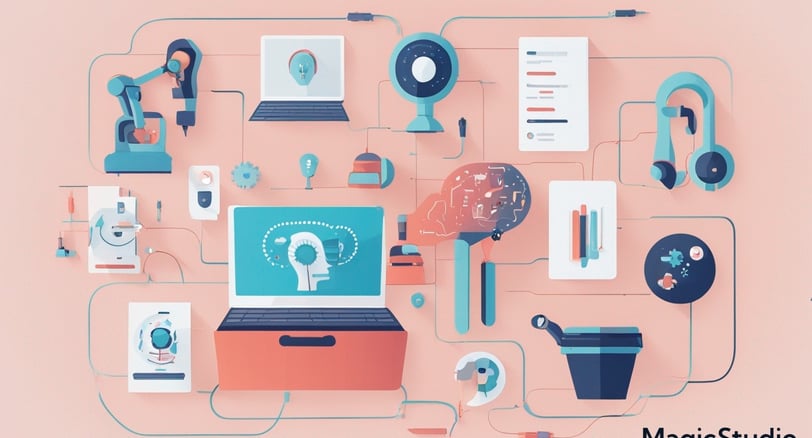6 Leading AI Assistants Transforming How We Access Information in 2025
In today's rapidly evolving technological landscape, artificial intelligence has revolutionized how we interact with information. AI assistants, often called chatbots, have emerged as essential tools across various domains—from marketing and sales to content creation and research. These intelligent systems have fundamentally changed our information-seeking behavior, offering direct answers without the clutter of advertisements or the need to navigate multiple websites.
Harsh Gupta
5/1/20253 min read


Let's explore the six most influential AI assistants that are reshaping our digital experience in 2025.
1. ChatGPT by OpenAI
This was the first chatbot that was launched by OpenAI, and after its launch, suddenly the news websites were filled with the term Artificial Intelligence. Many people around the world got to know about AI after the launch of ChatGPT. It definitely shocked the world. Its launch was an incident, after which concerns related to AI were all over the world.
Key Capabilities:
Advanced natural language processing that understands nuanced queries
Contextual awareness that maintains conversation coherence
Knowledge generation across diverse domains
Regular model updates that improve performance and capabilities
ChatGPT remains distinctive for its balance of accessibility and sophisticated reasoning capabilities, making it suitable for both casual users and professionals across industries.
2. Perplexity
Perplexity has made its unique image in the AI chatbot world. It provides multimedia resources in its responses. This feature gives its users more options, making it a powerful tool.
Standout Features:
Integration of relevant YouTube videos alongside text responses
Real-time information retrieval from current sources
Transparent source attribution that builds user trust
Conversational search interface that feels natural and intuitive
For researchers and learners who appreciate having multiple formats of information presented simultaneously, Perplexity offers a particularly appealing solution.
3. Deepseek
The launch of Deepseek is also a turning point in the world's history, because its launch challenges US hegemony in the technical world. As we all know, the US is known for its technological advancement, but this AI tool comes from China, a country that the US considers its enemy. And this tool was made using a fraction of the money that US companies use and also provides very cheap subscriptions to its users, comparable to other AI tools.
Notable Attributes:
Exceptional reasoning capabilities across complex problems
Efficient code generation for developers
Strong multilingual proficiency supporting global users
Significantly lower production and operational costs
Deepseek's emergence highlights how competitive the AI assistant market has become and signals the increasingly international nature of AI development.
4. Gemini by Google
In comparison to other AI chatbots, Gemini has a more dynamic and large database because it has access to all the data that Google has collected throughout these years. This tool is designed to integrate with Google's entire ecosystem — like Gmail, Docs, and Search.
Primary Strengths:
Sophisticated multimodal processing capabilities
Robust reasoning for complex queries
Seamless contextual integration with Google services
Designed to enhance productivity across multiple applications
Gemini demonstrates how AI assistants are evolving beyond standalone products to become integrated components of broader digital ecosystems.
5. Grok
This tool is known for its large integration with Twitter. This AI tool can provide us social media insights. And this AI tool was a topic of discussion in Indian media after its integration with Twitter. It also provided satirical responses in its replies, often containing strong language, and this makes it unique.
Distinctive Elements:
Access to real-time social media conversations and trends
Integration of humor and personality into responses
More permissive approach to responding to controversial topics
Direct connection to the cultural conversations happening on X
Grok represents a different vision for AI assistants—one that emphasizes cultural relevance and personality alongside traditional information retrieval.
6. Claude by Anthropic
Anthropic's Claude has distinguished itself through its focus on thoughtful, nuanced responses and its commitment to responsible AI development principles.
Core Strengths:
Exceptional nuanced reasoning for complex topics
Implementation of Constitutional AI frameworks for safety
Industry-leading long-context understanding
Balanced approach to helpfulness and harm prevention
Claude exemplifies how AI assistants can be designed with ethical considerations as a primary design principle rather than an afterthought.
The Future of Information Access
These six AI assistants represent different approaches to solving similar problems—making information more accessible, useful, and contextually relevant. As these technologies continue to evolve, we can expect even greater integration into our daily workflows and decision-making processes.
For professionals across industries, developing fluency with these AI tools is increasingly becoming a competitive advantage. Understanding their relative strengths, limitations, and use cases can help you leverage them effectively for your specific needs.
Whether you're a content creator, researcher, developer, or business professional, these AI assistants offer powerful capabilities that can enhance your productivity and expand your information horizons.
Insights
Explore AI tools for small business automation today.
Connect
Support
© 2025. All rights reserved.
